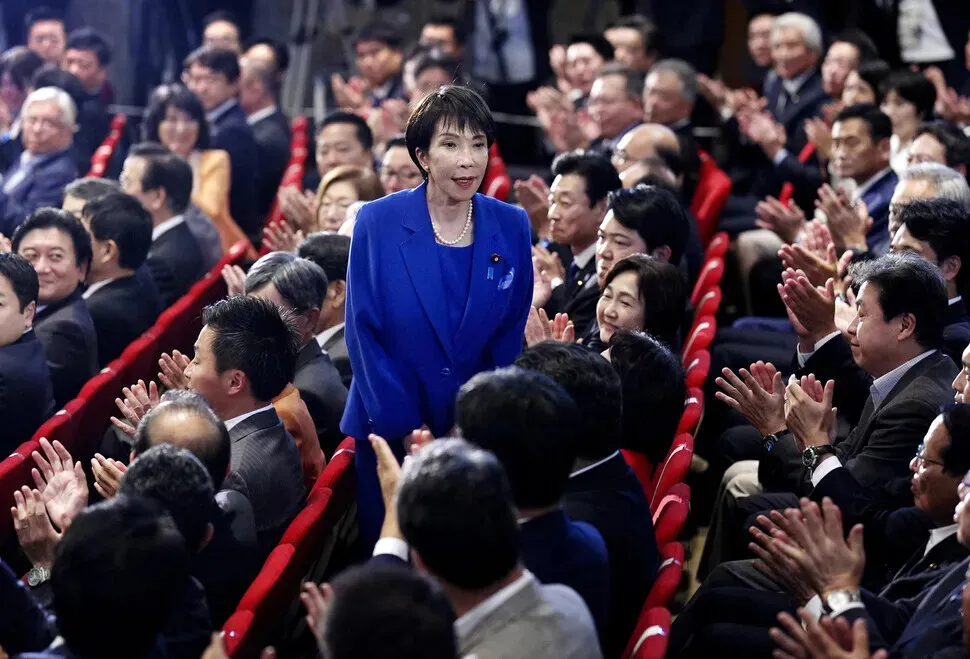
Sanae Takaichi stands and greets her party after being elected leader of Japan’s ruling Liberal Democratic Party on Oct. 4, 2025. (Kyodo/Yonhap)
The election of Sanae Takaichi as the next leader of Japan’s ruling Liberal Democratic Party has sparked concerns that South Korea could face even further challenges to its foreign policy.
Following her inauguration as prime minister, she is likely to tone down her right-wing rhetoric by opting not to visit Yasukuni Shrine, where Class A war criminals from the Pacific War are commemorated, but it’s difficult to say how long such moderation will last.
The Asahi Shimbun reported on Thursday that Takaichi is considering canceling her visit to Yasukuni Shrine during the Autumn Grand Festival from Oct. 17 to 19. When she was a Cabinet member, Takaichi visited the controversial shrine not only on Aug. 15, the day Japan lost World War II, but also during spring and fall festivals.
She has publicly stated that she will visit the shrine even if she becomes prime minister, but when asked about her intentions to visit Yasukuni during his election as party leader on Saturday, she struck a different tone, saying that she would “determine things accordingly at the proper time.”
This shift in stance seems to be based on considerations of important foreign policy issues she will soon have to deal with upon her inauguration. US President Donald Trump is scheduled to visit Japan from Oct. 27 to 29, a visit which will be shortly followed by the Asia-Pacific Economic Cooperation summit in Gyeongju, South Korea, on Oct. 31.
Shinzo Abe was the last sitting Japanese prime minister to visit Yasukuni Shrine. At the time, the US expressed “disappointment” at this move. Also, concerns expressed by the ruling coalition junior party Komeito regarding Yasukuni seemed to have played a part in Takaichi’s apparent decision to forgo a visit to the shrine.
It’s difficult to say whether Takaichi will adopt a realist approach after officially taking office, or whether she’ll maintain her hard-line right-wing stances. However, her recent shift in stances does not indicate an ideological shift, and hard-line conservatives make up her main support base. During a lecture in 2022, Takaichi described her political rivals as having an “ambiguous attitude” displayed by “not visiting Yasukuni while clambering for position.”
During a TV appearance in 2022, Takaichi was asked whether she thought that Japan’s war after the Mukden incident was a “war of self-defense.”
“I think it was a war for security,” she said.
On Sept. 28, regarding the subject of Shimane Prefecture’s “Takeshima Day” — a day celebrating Japan’s claim to the Korean territory of Dokdo — Takaichi said, “A state minister should attend with confidence. There is no need to be self-conscious.”
“The story of Japanese territory is something we should all know,” she added.
Up until now, the Japanese government has stuck to sending deputy ministers to the Takeshima Day event.
“During the LDP’s process of electing its new leader, Takaichi said that she would continue cooperation measures with South Korea, but it remains unclear how long she’ll maintain that stance,” assessed Cho Seong-ryoul, a professor of military studies at Kyungnam University who previously served as Korea’s consul general in Osaka.
“Taikaichi has strong far-right tendencies, even compared to Abe. Moreover, the current Japanese economic situation is not good, and there is little political room to maneuver when it comes to Japan’s US policy, China policy, and North Korea policy. Because she has to keep her constituency in mind, there is always a chance that she’ll visit Yasukuni or go on the attack when it comes to historical disputes with South Korea,” he added.
“In the current diplomatic landscape, the Lee Jae Myung administration has pragmatically pursued a strategic partnership with Japan while working to minimize risks coming from Japan. While there was room for cooperation with [Current Japanese Prime Minister Shigeru] Ishiba, the appearance of the far-right Takaichi has made our policy toward Japan much more difficult,” Cho went on.
“Still, the ongoing tariff negotiations with the Trump administration in the US and other factors that complicate Korea’s diplomatic environment require it to work with Japan, meaning that rather than making some big preemptive change to our relationship with Tokyo, we should pay close attention to Takaichi’s policies and react cautiously,” he suggested.
By Hong Seock-jae, Tokyo correspondent; Park Min-hee, senior staff writer
Please direct questions or comments to [english@hani.co.kr]

AloJapan.com